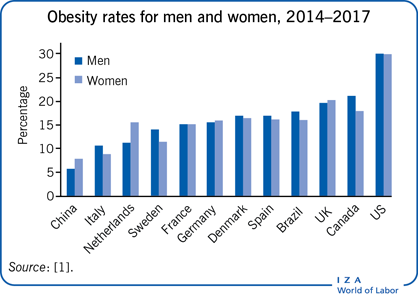Elevator pitch
Rising obesity is a pressing global public health problem responsible for rising health care costs and in some countries one of the leading causes of preventable deaths. There is substantial evidence that obese people are less likely to be employed and, when employed, earn lower wages. There is some evidence that the lower earnings are a result of discriminatory hiring and sorting into jobs with less customer contact. Understanding whether obesity is associated with adverse labor market outcomes and ascertaining the source of these outcomes are essential for designing effective public policy.
Key findings
Pros
Numerous studies using data from many countries make use of clever econometric methods to document a plausibly causal negative effect of obesity on earnings and employment.
Obesity is a significant driver of higher medical costs for adults and children.
There is credible evidence that obese people face discrimination in the labor market, either taste-based or statistical discrimination.
The dynamic effects of obesity may matter for labor market outcomes.
Obesity impacts cognitive and non-cognitive skills and this may start early in life, indicating that early-life obesity may have long-term economic consequences.
Cons
Data sets drawn from survey data with information on labor market outcomes often have weak coverage of health issues, so obesity measurements may not be accurate enough for rigorous statistical studies.
Despite strong correlations between obesity and adverse labor market outcomes, causality is difficult to demonstrate—and the direction of causality could run from lower wages to obesity.
It is possible that there is no causal relationship in either direction, or that a third factor is linked to both obesity and labor market outcomes.
Researchers have begun to use data that allows for the use of genetic risk scores as instrumental variables; however, it is unclear if the scores satisfy the required exclusion restriction for instrumental variables estimation.
